For the beautiful country of Kyrgyzstan I had a visa for a whole month. Due to the low temperature and the snow there were not many activities possible though, such that I decided to move on to China as quickly as possible.
After my time consuming journey from Fergana to Osh, I wanted to rest for bit and visit the second largest city in Kyrgyzstan and especially its bazaar. The main goal however was to organize a transport to the Irkeshtam Pass. My accommodation was going to be the Osh Guesthouse, one of the first places to go to when looking for possibilities to ride along to the Chinese border. The question whether I wanted a single room or a bed in dorm sounded somewhat strange, since I was the only guest at the place and the prices differed by a factor of 2.
At least during the summer months there is a bus from Osh in Kyrgyzstan to Kashgar in China, my next larger destination. In winter however this option is not reliable due to the road conditions and the lack of tourists.
After a comfortable night in my sleeping bag I headed out for the different meeting places for transportation. On the one hand side I had already spoken to the manager of the Osh Guesthouse who could organize a ride for me for Tuesday. I still wanted to check out possible alternatives. My first address was the Argomak 4WD stand, which I finally found after asking for directions twice. There was one ride going 45 minutes later that day to Sary Tash, the last larger village before the Irkeshtam Pass. From there I could have hitch-hiked with one of the Chinese trucks going across the border. The other transportation hub unfortunately had nothing to offer. Therefore I went on a walk around the city center and headed back to the Osh Guesthouse where I was to meet with a prospective driver. I knew that there was only a very limited chance that I could find other tourists for the same trip during this time of the year, which is why I decided to take the easy variant and told the driver I would take up his offer. At 6pm that afternoon we would be leaving.
Suddenly everything had gone really quickly and thus I had about 5 hours left in Osh to have a look at the bazaar and the city and to write a few e-mails. The open bazaar lies along the Ak-Buura river, which flows through the center of Osh. Once more it was interesting to dive into the bazaar and dive I did. I entered the bazaar through a small side street and ended up in the textiles section, where the shops hung their offerings not only in their shops but also across the street.
Metal workers who sold their products in bazaars was nothing new, but the many repair men offering their services in Osh was quite a new experience. All kinds of appliances were repaired, knifes ground and shoes were given new soles.
When one is walking through the streets of Osh or through the bazaar, one realizes how poor the country is. It has many interesting things to offer to tourists, especially in the mountains, but the main source of income is agriculture. One also realizes that there is a certain presence of the American Peace Corps. For the first time in a long time I was being asked by local people whether I am American. In Uzbekistan most people suspected I was French, probably due to the Club Med offerings in that country. The information was given to me by a student who works for CBT (Community Based Tourism, an organization involving the locals in tourist activities such as yurt stays).
Just before 6pm I was back the Osh Guesthouse where Murat my driver to Irkeshtam was already waiting. I put on my warmest clothes and packed the rest in the backpack. I was quite surprised to find out that the car was going to be full up to the one seat in the front left, which was going to be my seat. This is a common procedure in Central Asia that the only paying passengers are the tourists and thus they have to split the cost among them. Knowing this, one can get better deals when negotiating a price. In this case the other passengers were mostly of Murats family. I finally paid the full price but not without the corresponding remark in Russian. Murat’s parents understood what he had done and were not very pleased about it. Under different circumstances I had organized the transport to Sary Tash in a shared taxi and hitch hiked from there, since the price even for four people is too high. At least I saved a little bit of money due to negotiation.
A second disadvantage of the chosen variant was the drive during the night. Already the drive from Osh to Sary Tash leads across three overpasses. It is unbelievable how much traffic there is even in winter along this road. Most of the traffic are Chinese trucks serving Central Asia with cheap Chinese products. No wonder that the Chinese plan a high-speed rail system across Central Asia to make this hazardous journey unnecessary.
Up to Sary Tash the four hour ride was unspectacular. In Sary Tash we stopped for a short break at the house of Murat’s family. In their small house three generations life on very little space. Everyone is helping everyone else and everything is done in a community fashion. The toilette is about 20 meters from the house, which is not exactly what I would call convenient during winter with temperatures far below 0°C.
After Sary Tash the road climbed steeper and steeper and it took as 2.5 hours to make the 90 kilometer trip to the small village of Irkeshtam right at the border. The road sometimes encased by man-high walls of snow was only cleared by two wheel loaders. There job is it to remove the snow where it had piled up too high. One can imagine that this equipment only gives a limited capability of keeping the road clear, especially when one of the two machines break down like on this Tuesday night. At many places only one lane of the road could be used and in those places deep gutter like trails at the width of truck tires formed the road. Luckily Murat was a good driver and even brought us through those places without any incident.
Ever so often we saw trucks which were stuck in the snow and had to be freed by manual work. A further problem for those trucks was the temperature. Since diesel forms lumps at freezing temperatures some of the drivers let the engines of their trucks run through the night. In case they didn’t do that the used flame throwers to heat up the tanks, quite a dangerous solution.
Around 1:30am we finally reached Irkeshtam. I there was assigned a place to sit and later sleep in one of the guesthouses for the workers and truck drivers. I had the honor not to sleep with the guests but to stay with Murat’s family in the main room. The re-purposed the eating place by removing the table cloth and replacing it by several blankets. I slept quite well, but the night was too short. Already around 7am the mother of the family started moving around again to prepare food and drinks for the guests. She prepared a porridge and even some fresh bread. But the bread would not be started before the old bread was eaten and thus we did not eat any of it.
After breakfast I had a few minutes before I had to be at the border at 9am. There I realized what advantage it is if there is a local who gets the officers attention and makes them move on. I immediately could move forward to get my exit stamp and was lucky enough to be assigned the second truck passing the border that morning to bring me to the Chinese control point.
There was however the first obstacle to take: in the middle of no-man’s land there is a bar operated by the Chinese. This bar remained closed until it was impossible to reach the Chinese control point before their lunch break. This once I had reached the first Chinese border control point, I had wait for three hours until the officers finished their lunch break. I wonder what kind of meal they had! At least they had collected all the passports of the passengers such that the procedure was a little bit quicker when they retook business. I used the lunch break to get acquainted with Satar, a Tadjik truck driver who happened to be a passenger as well on this day. With my limited knowledge of Russian I was able to get some information from him and that we could go and eat together.
When the Chinese control point re-opened on time we had to walk across the little settlement to the trucks where we were supposed to get back on the truck in which we had arrived from the Kyrgyz border. I could not find my driver anywhere and was unable to explain that to the officer who only spoke Chinese. He started hyperventilating and finally had the great idea to just put me on another truck instead. The statement was that we should get on the trucks to bring us to the main border check point where we would get our passports stamped. I assumed that ride would take a few minutes and was quite surprised when we arrived at the second control point hours later. The only activity there was to check whether there was a person for each passport and vice versa. I think this procedure took about an hour and a half before the convoy continued. At least the landscape had a lot to offer. I knew mountains from back home, but the size and the wide valleys along with the reddish
colors of the rocks were new to me. Again the blue sky, the red rocks and the white snow contrasted beautifully.
On the following stretch I was wishing my original truck driver and his truck back. We got stuck three times in the snow. The first and third time, the driver increased the amount of snow chains on the truck, the second time we managed to get out by shoveling some dirt on the road. When we finally reached the official new border control station new it was 2am Beijing time, and of course at this time the border station was closed. Up to that point we had driven about 150 km from the physical border.
My next big question was where I could spend the night. Somehow I ended up in a minivan of the Chinese border control and they drove one other passenger and me to a lit and heated room in the border station. That was going to be the place where we would spend the night. There was really nothing in the room except for a tiled floor. The other passenger rolled out a thin mat and laying down covered himself with his heavy jacket. Following his example I unpacked my sleeping bag and lay down on the floor as well.
The border control station opened at 11 o’clock Beijing time such that I had time to explore the border control station and its environments for a little it. There was a beautiful sunrise although the temperature was not really enjoyable. One has to know that during this time of the year the sun rises at 10:30am in the West of China. The locals live according to Xinjiang time which is two hours behind and a more reasonable time in this area.
During the official immigration process for China I was particularly honored. According to the motto “we have to capture how an Oli enters China” an official uniformed photographer documented step by step my immigration from retrieving entry and exit cards (which was done by officer who wanted to get to know the new machine) across passport control all the way to customs. The latter was simple this time since I only had to put my backpack on the x-ray machine and there were no questions asked.
Summarizing the immigration process from the border crossing in the mountains until I had my passport stamped took 24 hours and 10 minutes of which I sat in a truck for about 11 hours. This very much was dependent on the road conditions and that we were stuck in the truck for about 2 hours. Even though I had a guide book describing the whole process I was not well prepared to what was to come due to the fact that the Chinese had changed the immigration process only a few days before I arrived.
With the help of Satar I found a truck driver who would give me ride to Kashgar. This time it was not a Chinese, but an Uzbek fellow named Eshgas Boy. During the ride we could exchange a few basics in Russian before he dropped me off on the freeway at the last exit before the city about two and a half hours later. I thanked him in Uzbek for the ride and wondered how I was going to find a ride on a freeway. But not even 2 minutes later I was able to flag down a taxi which brought me to the old town of Kashgar for a reasonable price. Fortunately Satar had told me how much I should pay and due to the fact that the driver was Uighur I understood the numbers he mentioned, to which I could immediately agree. It was a little bit more difficult to make clear to him where I wanted to go, since he could do nothing with the address I had written down in Latin letters. Luckily I had also written down the name of the closest tourist attraction, which he knew, and thus we were on our way. From the Id Kah mosque it was only a short walk to my accommodation for the next few days, the Kashgar Old Town Youth Hostel.

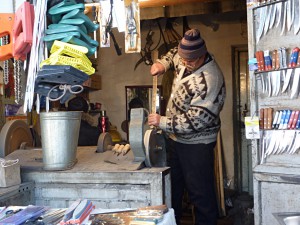
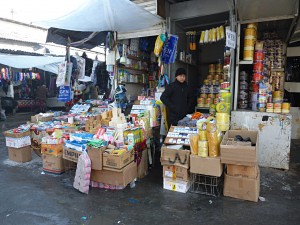
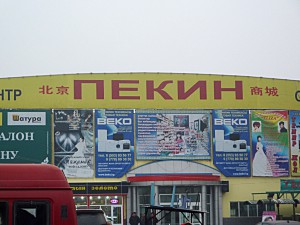
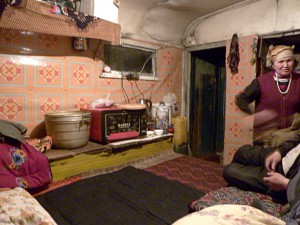
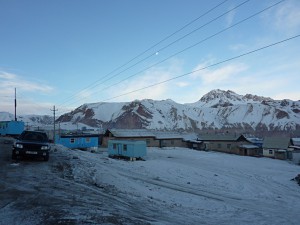
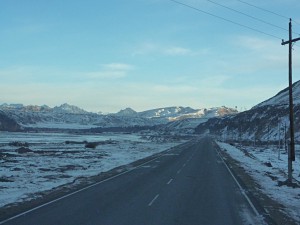
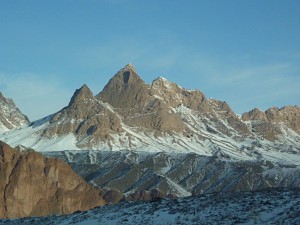
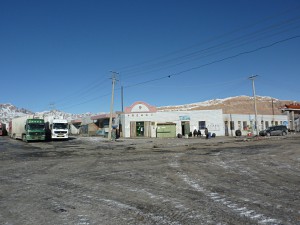
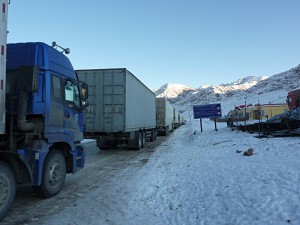
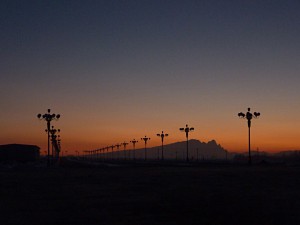
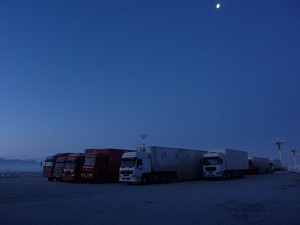
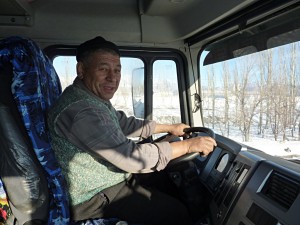
Hoi Oliver
Hatte aehnliche Erfahrungen zwischen Osh und Kashgar. Allerdings war es Sommer und nur Nacht’s minus Temperaturen. Aber bei der Ankunft in China Aufstaende. Kannst du noch auf deinen Blog zugreifen? Wuensche dir viel Vergnuegen mit der Verstaendigung in Mandarin.
Gruss, Hans
Hoi Hans,
bei mir war das groesste Problem die Tatsache, dass das Einreiseverfahren geaendert wurde, denn es hiess bei der alten Grenzstation oben auf den Berg, wir sollen in die LKWs einsteigen und mit denen zur Grenzstation fahren. Ich dachte wirklich es geht nur um ein paar Minuten und nicht um 10 Stunden.
Internetzugriff funktioniert in der Gegend wieder einwandfrei, Blogspot ist allerdings weiterhin gesperrt. Ich hatte aus weiser Voraussicht meinen Blog bei einem Internet Provider in der Schweiz gehostet…
Gruss aus Hotan
Oli